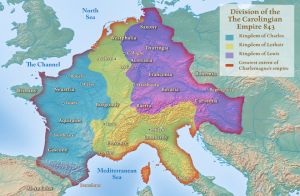In this episode, we look at the English terms associated with kings and nobility and explore the concept of Anglo-Saxon kingship. We also look at the poetry of the 9th century poet Cynewulf. The link between kings and Cynewulf is a shared root word which gave us the modern word ‘kin.’ Lastly, we examine the initial phases of Viking raids in Francia and Britain.
Podcast: Play in new window | Download
Subscribe: RSS


In Norwegian “kvinne” means woman, while “kona” is the word for wife, both from the same root. Queen, on the other hand, is “dronning”, as in Dronning Maud Land which comprises about a fifth of Antarctica.
This episode also made me think of the northern Scottish word “quine”, meaning a young woman or girl (similar in meaning to “lass”).
Hi, cant remember the exact episode where you discussed the etymology of king etc. Theres a place in the uk called manchester but the inhabitants are “mancunians”, pronounced man-cue-nians- was wondering if theres any link to the old word for king or just coincidence. Love your podcast- you anticipate questions well and its always very informative.
Btw, when american english splits from british english, which one will you concentrate on (if any?). Keep up the excellent work x
Plus, can you put your transcripts on eg amazon.co.uk as its too expensive for brits to buy in us dollars, cheers jen.
Hi Jen. Despite being similar sounding terms, there doesn’t appear to be any etymological connection between “Mancunian” and the word “king’ or the Old English term “manncynn” (“mankind”). “Mancunian” is derived from the Late Latin word for the city which was “Mancunium” and its adjective form “Mancuniensis.”
When I get to the split of American and British English, I am going to try to maintain a parallel narrative. It is going to be tricky, but that is the plan.
Lastly, thanks for the suggestion about the transcripts. My current plan is to bundle the first 100 episodes into a package. When I have that ready, I may make it available through Amazon as an e-book.
Egbert c 800 can’t possibly be the 14th great grandfather of current queen . That is 16 generation for 1200 years – 75 years per generation !
See next episode.
Great podcast: many thanks. In relation to the division of the Carolingian empire, it’s worth noting that Middle Francia was actually seen as the most prestigious of the three blocs created by the Treaty of Verdun and was therefore allocated to Lothair I, who was the eldest son of Louis the Pious and his successor as Holy Roman Emperor. It was conceived as a long thin territory so that it contained and connected the imperial ‘capital’ of Aachen and Rome: so was highly symbolic. In his excellent book ‘Lotharingia’, Simon Winder argues that this created a fault line of contested land between future France and future Germany that continued to be fought over for centuries e.g. Alsace-Lorraine, shaping European history as late as WW2. A really interesting analysis.
After hearing this episode, Hamlet’s first words have even more resonance for me: “A little more than kin, and less than kind”.